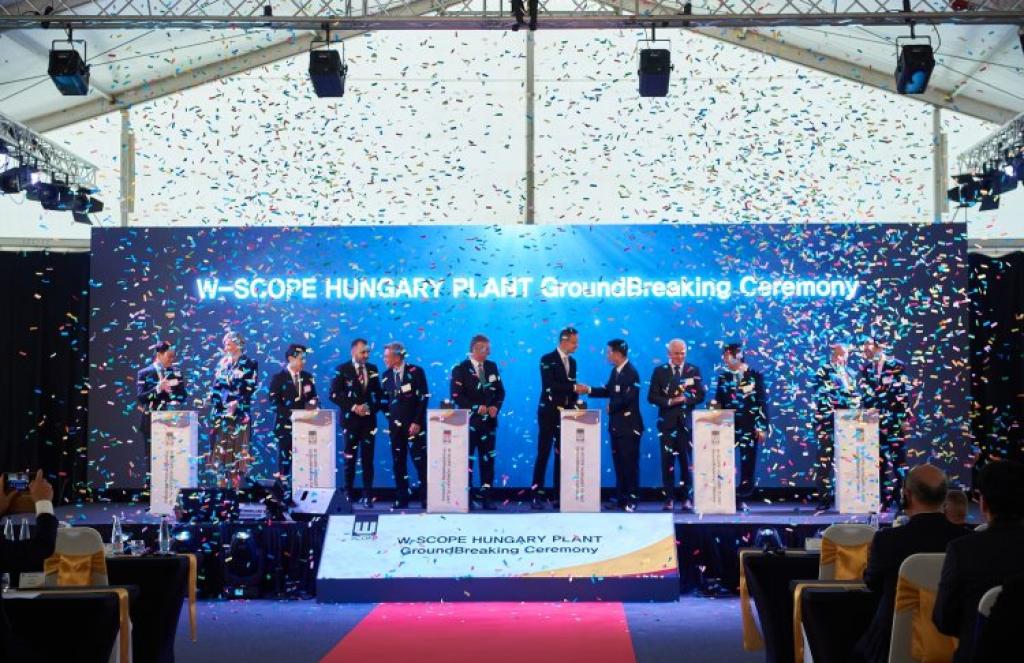Thessaloniki gets ready for its metro launch in November
The underground rapid transit lines have been under construction for almost two decades due to various project delays
 TheMayor.EU logo
TheMayor.EU logo 
The celebratory ceremony after laying the foundation stone of the factory , Source: Lajos Szarka via City of Nyíregyháza
The city of Nyíregyháza, which will host the development, hopes to attract more foreign investment, regional services and logistics
On 18 October, Hungarian authorities broke ground on a new factory that will produce batteries for electric cars. The investment was made by the South Korean company W-SCOPE, with the future factory located in Nyíregyháza. According to an official statement, the investment would be around 300 billion Hungarian forints, or the rough equivalent of over 700 million euros.
In recent times, Hungary has been attracting a lot of foreign investment in the field of EV components. In August, authorities announced a massive 7-billion-euro deal with Contemporary Amperex Technology Co. Limited (CATL), a Chinese firm, to construct one of the biggest battery manufacturing facilities in the European Union.
The new W-SCOPE factory will cover an area of around 1.2 billion square metres and should provide jobs for about 1,200 people. The factory will start operations in 2024, according to an official statement by Minister of Foreign Affairs and Trade Péter Szijjártó.
Minister Szijjártó also pointed out that trade relations and investments between South Korea and Hungary have been increasing. Now, the East Asian country has grown to be the third-largest investor in the country, with the bilateral trade turnover between the two reaching a record 5 billion dollars.
This would be, as Nyíregyháza Mayor Dr Ferenc Kovács pointed out, a major milestone in the development of the city. He explained that the W-SCOPE plant could help to trigger other investment interests in the region and its industrial park.
Furthermore, it could also help boost vocational training and logistics with a slew of knock-on effects that an investment of this size could bring with it.

The underground rapid transit lines have been under construction for almost two decades due to various project delays

Now you can get your wine in Talence by paying directly in Bitcoin

That’s because the state has to spend money on updating the railway infrastructure rather than subsidizing the cost of the popular pass

Rethinking renewable energy sources for the urban landscape

The examples, compiled by Beyond Fossil Fuels, can inform and inspire communities and entrepreneurs that still feel trepidation at the prospect of energy transition

Now you can get your wine in Talence by paying directly in Bitcoin

The 10th European Conference on Sustainable Cities and Towns (ESCT) sets the stage for stronger cooperation between the EU, national and local level to fast track Europe's transition to climate neutrality.

At least, that’s the promise made by the mayor of Paris, Anne Hidalgo

The underground rapid transit lines have been under construction for almost two decades due to various project delays

At least, that’s the promise made by the mayor of Paris, Anne Hidalgo

Hostal de Pinós is located in the geographical centre of the autonomous region

Despite its church-y name, the district has long been known as the hangout spot for the artsy crowds

Urban dwellers across the EU are having a say in making their surroundings friendlier to people and the environment.

Forests in the EU can help green the European construction industry and bolster a continent-wide push for architectural improvements.

Apply by 10 November and do your part for the transformation of European public spaces

An interview with the Mayor of a Polish city that seeks to reinvent itself

An interview with the newly elected ICLEI President and Mayor of Malmö

A conversation with the Mayor of Lisbon about the spirit and dimensions of innovation present in the Portuguese capital














